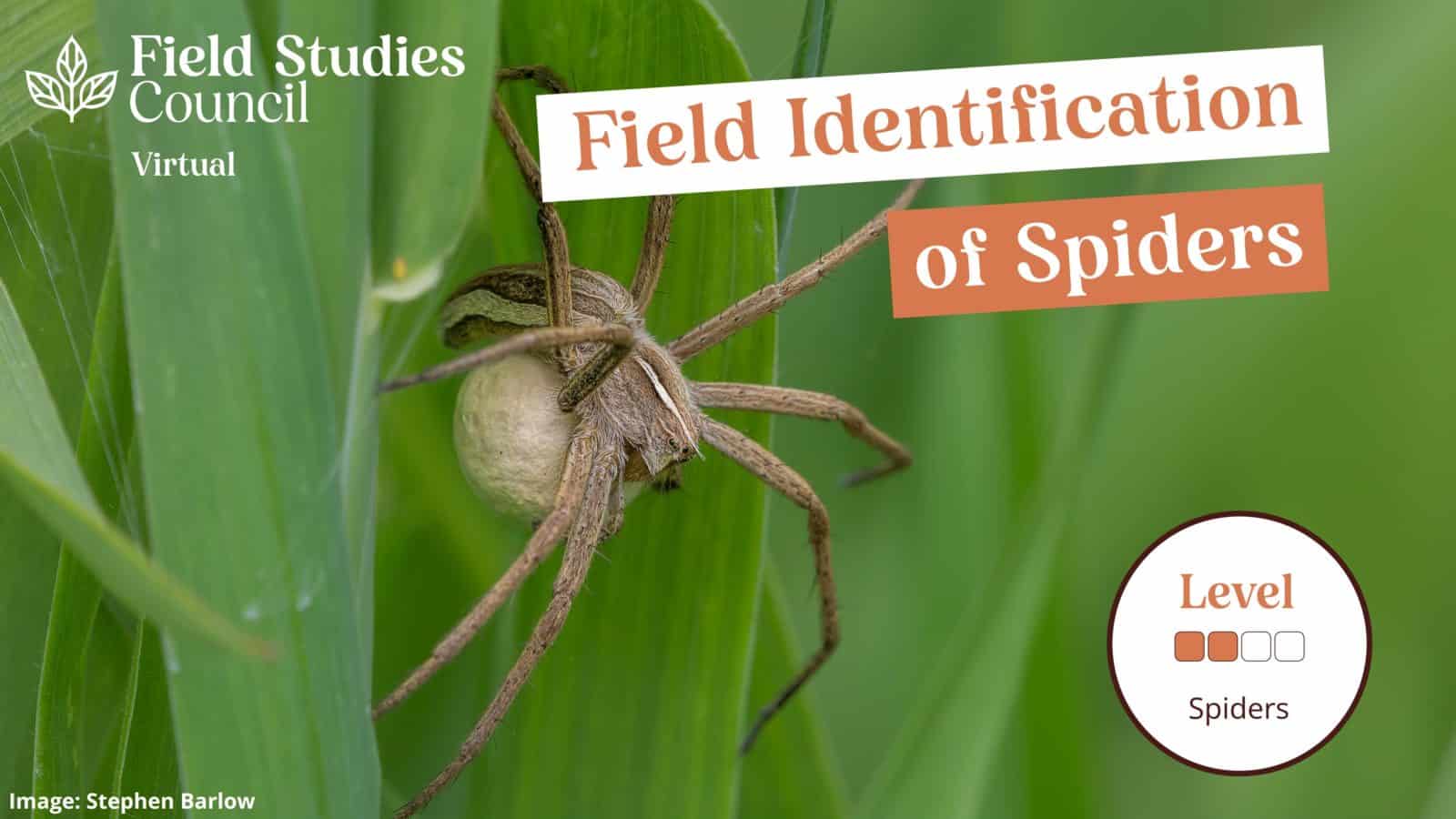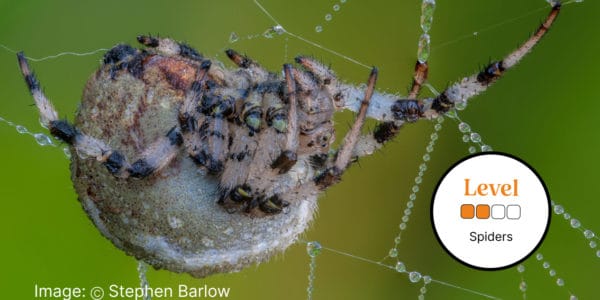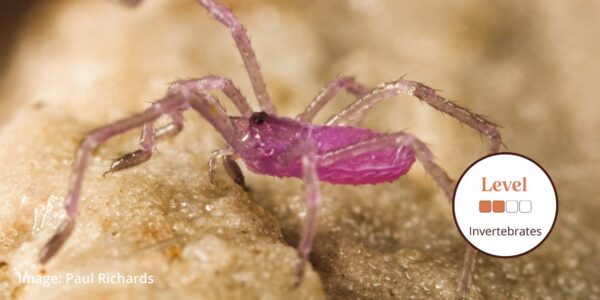Booking is no longer available for this course as it has already commenced.
There are over 650 spider species in the British Isles and despite being an invertebrate that is commonly found in our homes and gardens, relatively few people know how to identify the different species. Join our tutor in the field to search for, find and discuss the identification features of a variety of UK spider species that can be identified in the field.
Learn about the different groups of spiders and how to tell them apart, including Jumping Spiders (Salticidae), Comb-footed Spiders (Theridiidae), Crab Spiders (Thomisidae) Orbweb Spiders (Araneidae), Wolf Spiders (Lycosidae), and Long-jawed Orbweb Spiders (Tetragnathidae), among others.
This course will give you an introduction to the identification of distinctive spider groups and species.
During this course, you will be introduced to more advanced morphological features which will aid with the accurate identification of 8 of the UK’s spider families, 8 distinctive genera and 10 distinctive species of spiders found in Britain.
This course discusses the use of the FSC fold-out Guide to House and Garden Spiders by Bee and Lewington, and Britain’s Spiders: A Field Guide by Bee, Oxford and Smith (Second edition) although neither are necessary to complete the course.
- 4-week online course for adults, with a weekly time commitment of 3-5 hours per week.
- Access to study content, activities and tutor-graded assignments through the FSC virtual learning platform.
- Access to weekly live virtual classroom sessions at the end of each week with the course tutor through Zoom (recorded for those that are unable to attend the live sessions).
- E-certificate upon course completion.
- Learners will benefit from having access to a 10X hand lens and a sweep net or beating sheet/tray to get the most out of this course.
- Please email [email protected] if you have any questions.
This course is aimed at adults only and course attendees must be at least 18 years old in order to attend.
What topics are covered in this course?
- BWA 205 Spider Field ID Features: The first week begins with an introduction to spider eye orientation and general morphological features that will aid with Identification. We also introduce the main families of spiders commonly encountered by beginners and the features they possess.
- BWA206 Distinctive Spider Groups: The second week introduces field identification features used for telling distinctive spider genera apart. We also look at UK species which are the only representatives of their family in the UK.
- BWA207 Identifying Species in the field: Building on the features and families discussed in week one, learners will look at the identification of 10 species commonly encountered in the UK and the features used to separate them reliably within the field. This week also looks at some of the spider publications available for further self-study and the efficient use of each resource.
- BWA208 Recording Spiders: This topic covers why recording spiders is important, what kind of information should be included in species records and where records can be submitted and a final field assignment for learners to complete.
Course fees
Regular Price: £60 For professionals and residents outside of the UK. Select ‘Attendee (Online)’
Subsidised Price: £20 Subsidised by the FSC Biolinks project for non-professionals eg. volunteers, biological recorders, wildlife gardeners, amateur naturalists and students.Available to UK residents only. Select ‘Attendee subsidised (Online)’
Tutor: Lawrence Bee
Working in the natural environment, Lawrence Bee has developed a varied experience as an all-round field naturalist through extensive practical, hands-on work in the field of ecology and nature conservation. His particular interests include spiders, ancient trees and oak woodland, moths and plant galls. He is the co-author of the FSC foldout chart ‘Spiders of the house and garden’ and of the recently published WILDGuide ‘Britain’s Spiders’.The webinars will take place every Thursday for the duration of the course however webinars will be recorded and made available for those that are unable to attend.
The webinars will take place on the following dates and times:
- Thursday 16th June 2022 at 7.00-7.45pm
- Thursday 23rd June at 7.00-7.45pm
- Thursday 30th June 2022 at 7.00-7.45pm
- Thursday 7th July 2022 at 7.00-7.45pm
Webinars will be recorded and made available for those that are unable to attend.
Example Timetable
Week 1: Spider Field ID Features
Self-study material: available from 10 am on 09/06/2022
Assignments due: 7 pm on 14/06/2022
Week 1 live webinar: Thursday 16/06/2022 at 7.00-7.45 pm
Week 2: Distinctive Spider Groups
Self-study material: available from 7 pm on 16/06/2022
Assignments due: 7 pm on 21/06/2022
Week 2 live webinar: Thursday 23/06/2022
Week 3: Identifying Species in the Field
Self-study material: available from 7 pm on 23/06/2022
Assignments due: 7 pm on 28/06/2022
Week 3 live webinar: Thursday 30/06/2022 at 7.00-7.45 pm
Week 4: Recording Spiders
Self-study material: available from 7 pm on 30/06/2022
Assignments due: 7 pm on 05/07/2022
Week 4 live webinar: Thursday 07/07/2022 at 7.00-7.45 pm
The final deadline to complete any outstanding assignments and self-study components is 7 pm on 14/07/2022.
What's Included
- Access to study content, activities and tutor-graded assignments through the FSC virtual learning platform.
- Access to weekly live virtual classroom sessions at the end of each week with the course tutor through Zoom (recorded for those that are unable to attend the live sessions).
- E-certificate upon course completion.
Bursaries and Subsidies
FSC BioLinks
FSC BioLinks is an exciting project for FSC in the South East and West Midlands, bringing together existing volunteers with skills in biological recording and identification, and new volunteers.
This project provides subsidised training courses, learning opportunities and digital tools focussed on invertebrate identification for anyone involved or interested in biological recording, to build and strengthen the community.
Invertebrates provide us with many useful ecosystem services, like pollination and decomposition, which we cannot survive without but their numbers are declining. Few people know how to identify or record invertebrates meaning there is a lack of data
We are delighted to have been awarded a grant of £1.23 million from the National Lottery Heritage Fund for this project.
Before You Attend
Week 1: ARA101 Spider Biology
Self-study material: available from 10 am on 09/06/2022
Week 1 live webinar: Thursday 16/06/2022 at 7.00-7.45 pm
Week 2: ARA102 Spider Silk and Spider Webs
Self-study material: available from 7 pm on 16/06/2022
Week 2 live webinar: Thursday 23/06/2022
Week 3: ARA103 Spider ecology and Behaviour
Self-study material: available from 7 pm on 23/06/2022
Week 3 live webinar: Thursday 30/06/2022 at 7.00-7.45 pm
Week 4: ARA104 Finding Spiders
Self-study material: available from 7 pm on 30/06/2022
Assignments due: 7 pm on 05/07/2022
Week 4 live webinar: Thursday 07/07/2022 at 7.00-7.45 pm
The final deadline to complete any outstanding assignments and self-study components is 7 pm on 14/07/2022.
Sorry this course has ended



